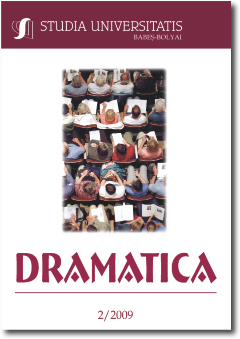THEATER OF WAR, THEATER OF WITNESS - CAN ART MAKE A DIFFERENCE?
THEATER OF WAR, THEATER OF WITNESS - CAN ART MAKE A DIFFERENCE?
Author(s): Domnica RădulescuSubject(s): Theatre, Dance, Performing Arts
Published by: Studia Universitatis Babes-Bolyai
Keywords: theatre; drama; memory; The DAH Theater; Motti Lerner; Erik Ehn.
Summary/Abstract: The expressions “theater of war” and “theater of operations” have been used since the end of the nineteenth century to refer to episodes, spaces and moments in history where actual war is being fought, where humans are killing and are being killed. “Theater of War” refers to the “entire land, sea, and air area that is or may become involved directly in war operations,” while “theater of operations” refers to “the part of a theater of war in which active combat operations are conducted.” Both terms were first used consistently to refer to World War I and then to World War II. It makes sense after all, for like in any war, just as in any theater, there is a protagonist and an antagonist who, depending on the angle one fights or watches the war from, change places and roles; there is a stage of course, the actual space where the war is being fought; there are actors who play different roles from the generals giving the orders to the soldiers actually engaged in combat, there are directors who create the larger vision of the show, namely the leaders and governments initiating and organizing it, and there are of course spectators: us the public, the great masses of people witnessing, watching and being shaken, those who are traumatized, or on the contrary rejoice or are indifferent at the sight of the war. Needless to say this kind of real theater of war is not a safe space and that would be a huge understatement. The theater of war that forms the subject of my study is on the contrary a safe space where actors and spectators choose to live or relive in a virtual, utopian or mediated way experiences, episodes, moments from actual wars, due to a desire to remember, to bear witness to actual wars and armed conflicts, to heal from traumas of war, but also really to be entertained.
Journal: Studia Universitatis Babes-Bolyai - Dramatica
- Issue Year: 2013
- Issue No: 1
- Page Range: 25-50
- Page Count: 26
- Language: English

